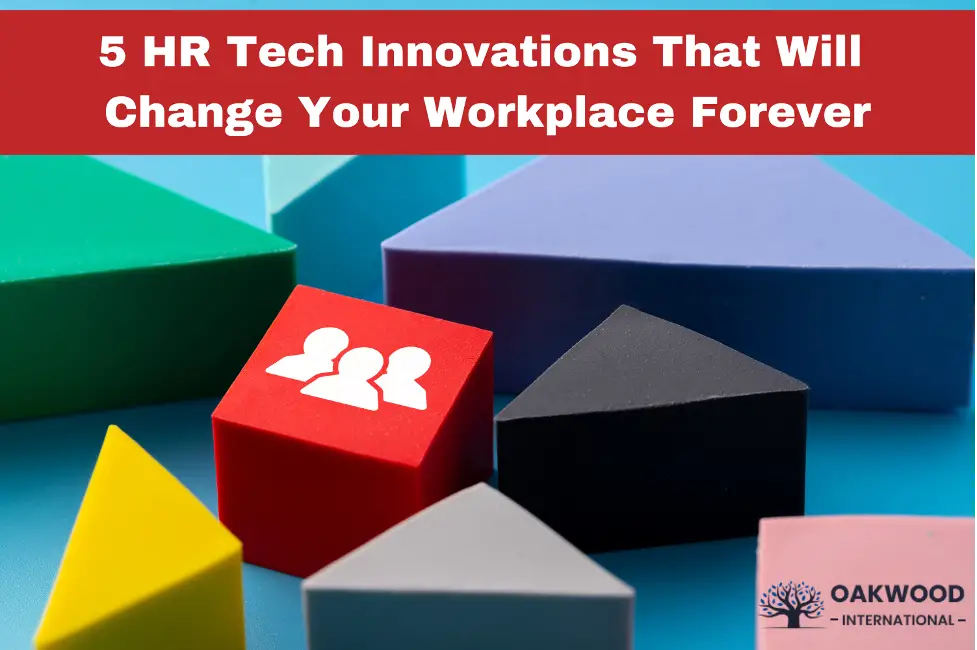The workplace is changing faster than ever, and HR professionals are at the heart of that transformation. So, what’s driving this shift? HR tech is making waves, creating innovative ways to manage teams, streamline processes, and boost employee engagement. If you’ve been looking to take your career in HR to the next level, HR Leadership Courses could be just what you need to get up to speed.
These innovations aren’t just for big corporations; they’re changing how organisations of all sizes work. Ready to dive in? Let’s take a closer look at the five HR Tech innovations that will reshape your workplace forever.
Table of Contents
- Key HR Tech Innovations That Are Shaping the Future of Work
- Conclusion
Key HR Tech Innovations That Are Shaping the Future of Work
Let us explore these groundbreaking HR tech innovations that are set to revolutionise the workplace and redefine how organisations manage their most valuable asset—people:
1. Artificial Intelligence (AI) in Recruitment
Artificial intelligence (AI) is one of the most potent HR technological developments; it has already started to revolutionise the hiring process. Using AI-powered interview simulations, AI systems can now analyse resumes, match candidates with the best-fit job openings, and even evaluate soft skills. In addition to accelerating the hiring process, this helps eradicate human prejudice, guaranteeing a fair and inclusive recruitment process.
AI also gives HR experts a more insightful analysis of the candidates they are considering. Predictive analytics, for example, can help find high-potential individuals; sentiment analysis can offer a more thorough understanding of candidates’ interview responses. AI’s capacity to simplify hiring and improve decision-making changes everything for companies trying to attract and keep top personnel.
2. Employee Experience Platforms
As modern workplaces develop, organisations are increasingly focusing on building a good employee experience. This is where Employee Experience Platforms (EXPS) find applications. Digital tools called EXPs let companies track and improve employee engagement, contentment, and well-being. These systems give HR departments a centralised venue to track performance, handle employee comments, and evaluate general job satisfaction.
By using sentiment analysis, real-time feedback loops, and consistent pulse surveys, EXPs enable HR teams to better understand employee feelings, issues, and potential areas of improvement in their working experience. The outcome is better organisational performance resulting from a more involved and efficient staff.
3. Workforce Analytics and Predictive Tools
Another area in HR tech that is significantly changing is workforce analytics. Data will help HR teams make better decisions regarding their personnel. By using a broad spectrum of employee data—including attendance, performance indicators, and turnover rates—workforce analytics solutions enable HR managers to see trends and patterns.
Forecasting future workforce patterns, predictive analytics advances this even more. These instruments can point out any skill shortages and recommend the ideal moment for raises or promotions. HR leaders may develop more successful strategies for personnel management, retention, and succession planning by leveraging workforce analytics and predictive tools, enabling companies to keep ahead of the curve.
4. Virtual Reality (VR) for Training and Development
Any company trying to create a qualified workforce has to prioritise training and development. Emerging as one of the most interesting HR tech developments for learning and development is virtual reality (VR). VR technology allows companies to provide more interesting immersive training opportunities than conventional approaches.
VR lets workers, for instance, participate in realistic workplace simulations that allow them to acquire practical skills in a risk-free, under-control setting. Whether it’s customer service situations or safety training for dangerous surroundings, VR offers a safe place for staff members to practise and grow free from mistakes. This technology also lets HR departments monitor staff development and offer focused comments on performance.
5. Cloud-Based HR Management Systems
Finally, HRMS based on clouds is changing how companies handle HR responsibilities. Historically, HR departments depended on on-site software or paper-based records, which made information access and team coordination difficult. Cloud-based technologies allow HR managers to access employee data, track performance, and handle benefits from anywhere globally.
These cloud-based systems make real-time cooperation possible, helping HR teams coordinate payroll processing, recruiting, and employee training more efficiently. Furthermore, as private employee data is kept safely and only accessible to authorised staff, the cloud-based character of these solutions offers companies improved data protection.
Conclusion
HR technology innovations are transforming how we manage and engage with employees. These technological advancements, from AI-driven recruitment to immersive VR training experiences, make HR departments more efficient, effective, and adaptable. Consider Oakwood International training to stay ahead in this field.
